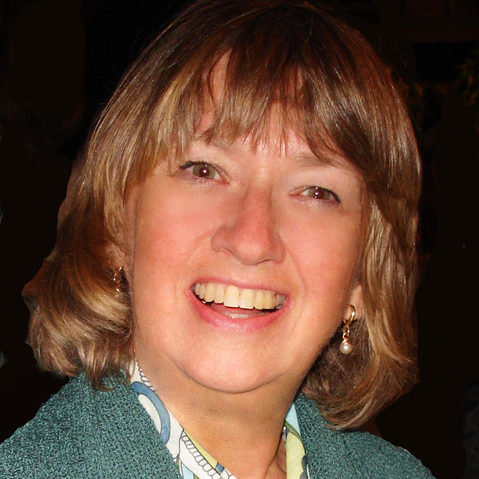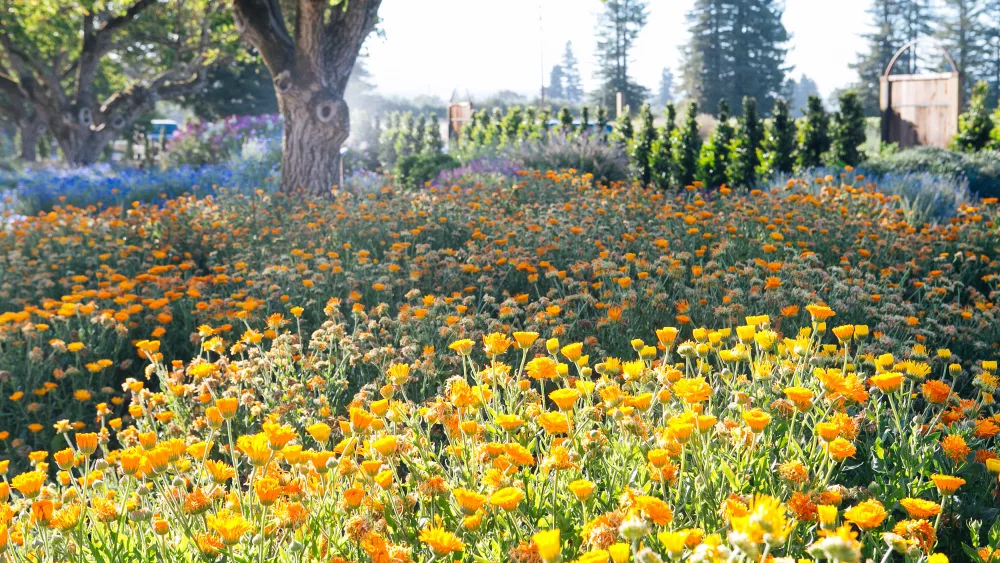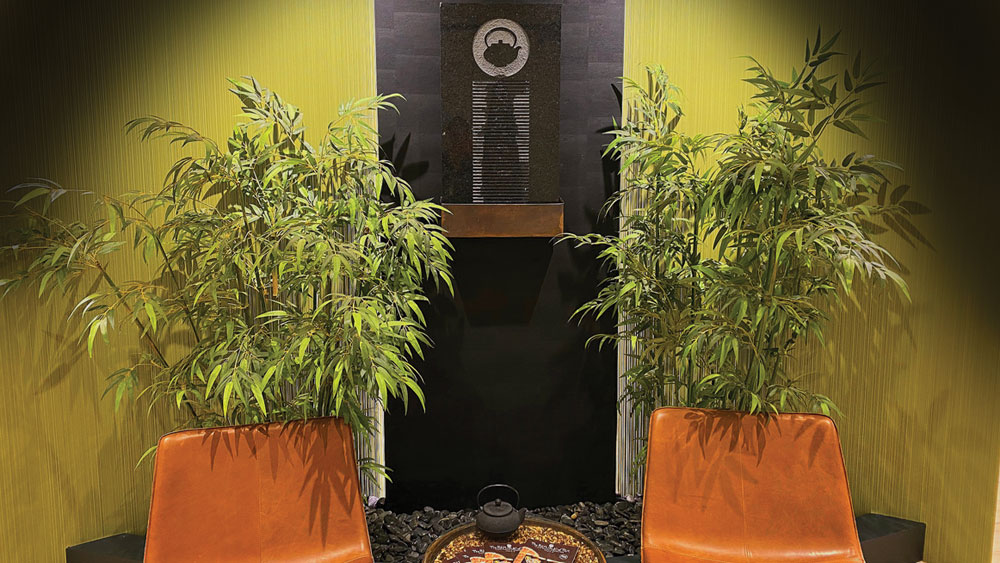
When The Republic of Tea, a purveyor of fine teas and herbal tisanes, moved its headquarters from Novato to The Exchange at Larkspur Landing early in 2020, its address changed, but the company’s design philosophy remained the same. Feng Shui was a given. An ancient practice that originated in China 5,000 years ago, Feng Shui is steeped in the belief that promoting the flow of positive energy and balancing the earth’s elements in a particular environment is the path to prosperity, good health and overall well-being. It might be an old concept, but it’s far from outdated. Instead, it’s increasingly relevant in a stressful world, where businesses make use of Feng Shui to create a pleasing workspace for their employees and increase productivity.
The Republic of Tea incorporated Feng Shui into the design of its former offices several years ago, so the company had already experienced its benefits. Starting fresh in a new location, however, was a chance to embrace the practice more fully and take advantage of new opportunities. “We were really attracted to The Exchange,” says Kristina Richens Tucker, The Republic of Tea’s minister of commerce and enlightenment. (Employees are called ministers, and its customers are citizens.) Among the advantages, it has appealing outdoor spaces with tall trees and water flowing over stone, and it’s close to the Larkspur SMART station, the Golden Gate Ferry and bicycle trails, so the commute is easy. In addition, one of The Republic of Tea’s embassies is Rustic Bakery, which is just across the street in Marin Country Mart, giving ministers the opportunity to frequent a business that sells The Republic of Tea’s products. “Those were all elements that attracted us,” says Richens Tucker. One of the prevailing thoughts in making the decision to move was that the company’s ministers would enjoy the features the new location offered.
Environmental sensibilities
Environmental considerations also played a role in the decision. In addition to offering a setting conducive to the practice of Feng Shui, The Exchange at Larkspur Landing has a strong commitment to environmental stewardship, and its environment-conscious practices are compatible with The Republic of Tea’s values. The buildings are LEED-certified; the site offers bike parking and electric vehicle charging stations; and energy and water efficiency and waste reduction are priorities. Its qualities thus made it a good fit for The Republic of Tea, which recently was certified as a Green Business by the County of Marin.
Many of the requirements were already in place when The Republic of Tea began making the transition to becoming a Green Business. “We had the bones of it,” says Richens Tucker. She explains that an impact team meets regularly to discuss the elements of the commitment to being environmentally responsible, and each member focuses on a specific topic, such as energy, water usage, or how to reduce waste or conscious purchasing. It can be as simple as finding improved ways to dispose of ink cartridges properly or a better way to commute, and each area under scrutiny advances a little more each time the team meets.
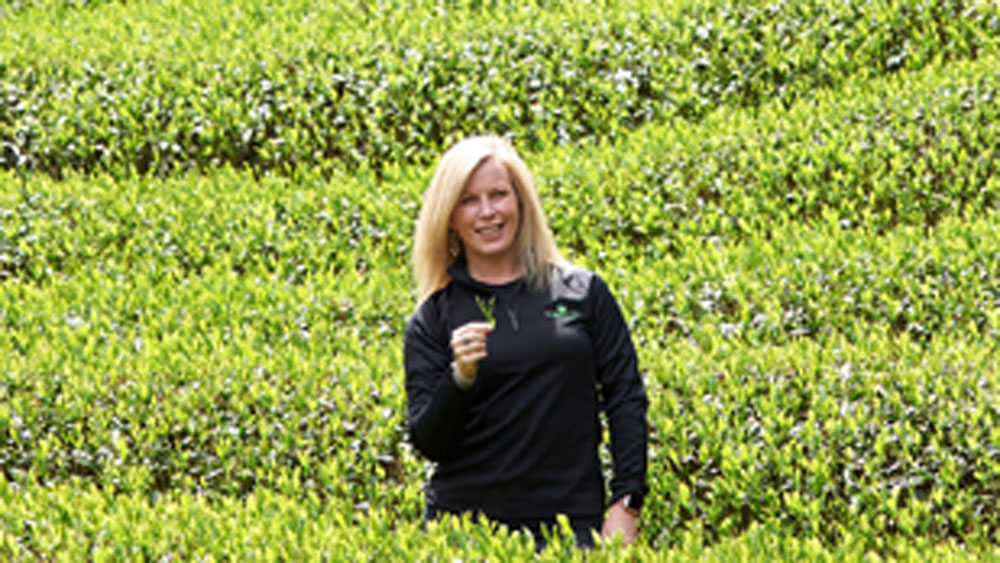
Concern for the environment is also reflected in the company’s packaging. Its iconic tins are made of recyclable steel, and its round teabags have no strings, tags or staples to dispose of. Throughout the U.S., 160 million Americans drink tea daily, says Richens Tucker. “All the unnecessary strings, tags and staples creates a huge amount of waste,” she observes. The plan also includes education in living green for the whole organization, and the company has a Healthy Ministers Program that encourages a wholesome lifestyle, with daily walking breaks, a nutritionist and monthly seminars, a pair of athletic shoes every year and gym memberships. Healthy snacks are always on hand as well.
Finding the flow
One of the most important factors in making the move was the chance to customize the 2,500-square-foot space and design it according to Feng Shui principles to create an environment that fosters purpose and intention. “We could design the offices around Feng Shui and build it out, and that played into the choice,” says Richens Tucker.
Feng means wind, and Shui means water, and the term Feng Shui comes from a poem that reflects on human life and its connection to the natural world around it. The practice involves looking at living, working and outdoor spaces, examining how the energy—called qi or chi—flows and finding balance with the natural world through careful planning of space and the placement of objects. When executed correctly, it directs the flow of positive energy along the desired path, while missteps can have the opposite effect and channel the flow of negative energy instead. The practice includes the use of the five elements—earth, metal, water, wood and fire—and the Bagua, a kind of map superimposed over the space, is used in planning to guide design and placement.
Todd Rubin, president and minister of evolution, has a degree in architecture and oversaw the company’s Feng Shui design at its offices at Hamilton Landing in Novato, and Lenore Weiss Studios of Chicago consulted on the space at The Exchange. “We started with a Bagua or grid of space,” says Richens Tucker. The strategy took into account eight different directions or principles and determined the best placement for the offices as well as objects and artwork. She observes that as a result, the campus provides a feeling of free-flowing movement and meandering with moments of discovery.
The first thing you see when you walk into The Republic of Tea is a granite teapot fountain. “It’s a symbol of career. You’re in a welcoming, career-focused space,” says Richens Tucker. The offices are to both the right and left, and reaching them is like being on a pathway, she explains, with positive energy creating a sense of calmness.
In addition, all offices have windows, so the natural light can travel and connect the occupants with nature. The conference room, called the Ginger Peach Room in honor of the company’s very first tea, includes a wall of tea that features all 300 beverages The Republic of Tea has produced since its beginning in 1992, each in its own distinctive metal tin. It represents the company’s history, and the red wall behind it brings in the fire element and encourages compassion, which is important in a space where open dialogue is the goal. It’s the only red wall in the room in a reflection of the belief that it’s best to avoid letting one design element overpower the others. In the case of red, “You don’t want to have too much, or you’ll burn out,” she explains.
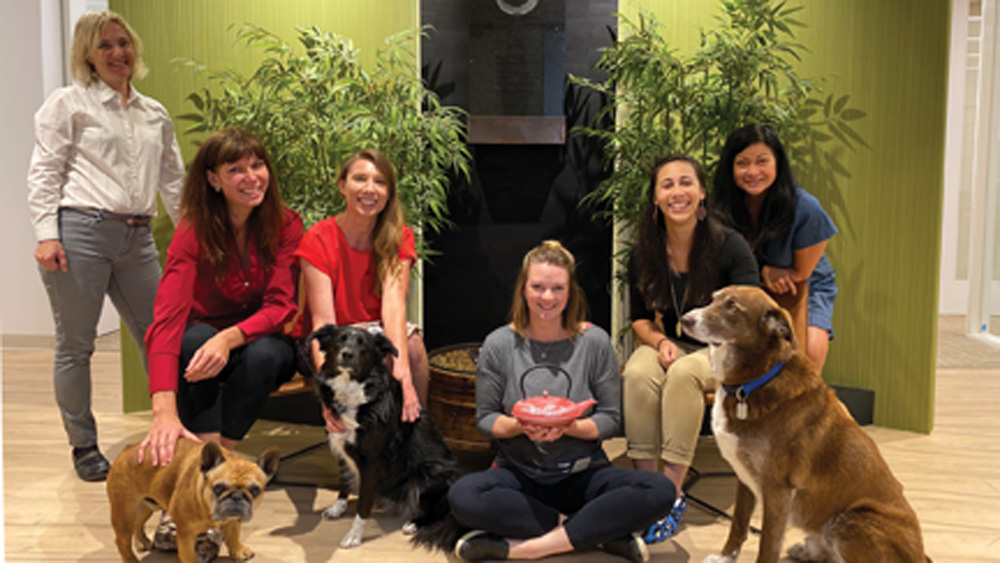
The conference table is wood, and the earth is present in plants and brown carpets, which have a grounding effect. “One of the far rooms is our cupping room,” she adds, and it’s where tasting new blends takes place, symbolizing the company’s future. It has metal elements, which are beneficial for the detail work, focus and discipline necessary for innovation. “That’s the space where we focus on the future, and we are disciplined about what we want to accomplish there,” she says. Being at the back of the premises also gives it an element of protection.
Blending new teas is at the heart of the business, and Feng Shui is a tool for encouraging creativity and productivity and providing the capacity to achieve them. We emphasize ‘Sip by Sip Rather than Gulp by Gulp,’” says Richens Tucker. The tea state of mind is one of calmness and flow that allows one to fit in with the surroundings and nourish oneself, she explains, an effect similar to that of Feng Shui. “That’s how tea and Feng Shui fit. It’s the calming and the flow,” she says, adding that the feeling of well-being they produce is stress-reducing and can open creative pathways.
The result is new products, which the company releases as each new season approaches. Its harvest blends for 2020 include Golden Pumpkin, a spicy infusion made with turmeric and pumpkin, and Pumpkin Spice Black Tea, as well as Hot Apple Cider, a perennial favorite. For the upcoming holiday season, “We have many aromatic and delicious seasonal teas,” she says. Red Hot Holiday Tea, for example, is a new entry in the lineup this year. In 2008, The Republic of Tea also partnered with Alexander McCall Smith, author of the No. 1 Ladies’ Detective Agency books, to produce a line of herbal teas made with South African Rooibos, or red bush tea, the infusion the book’s main character, Mma Precious Ramotswe, sips as she contemplates the evidence and unravels mysteries. The company launched the No. 1 Ladies’ Detective Agency Teas, when HBO aired a series based on the books. “It was a fun collaboration,” says Richens Tucker.
Feng Shui wisdom
Kathleen Zemansky, of Novato, is a Feng Shui master who first experienced Feng Shui consciously when she returned to the United States after living in Italy for several years. She hired a consultant to help reconfigure her space. “I was surprised how quickly my life started to shift,” she says. Her new awareness led her to study Feng Shui in Asia, and she now practices classical Feng Shui with a focus on business.
When Zemansky starts a project, she begins by asking about the company’s goals and what they hope to accomplish. Next, she looks at the space to determine what’s possible. “One of the best ways to manufacture the optimal Feng Shui is customizing the space for you,” she says. Feng Shui guides layout and is helpful in making decisions, such as where to put the reception area and entry points like the driveway, as well as the placement of a front door. The sales office is key to business success and should be in a more vibrant area. Whether it’s new construction, a building undergoing renovation or an existing space, she stresses the importance of using the energies in effective ways personalized to its occupants.

There is a misconception that Feng Shui is done on the inside of a building, according to Zemansky, adding that the practice always begins with analyzing the exterior landform and waterways surrounding a building. She suggests this pro tip when considering the space outside a front door. “Do you see positive things like lush green hills, or do you see a negative manmade form like a pylon? This is where the energy is generated, needs to be harnessed and directed to the building for the best outcome,” she says. An object such as a streetlight or even a large tree blocking a front door downgrades Feng Shui. Not everyone has the advantage of constructing a new building, she explains, so for a business that’s moving into an older structure, it’s best to up your game with Feng Shui strategies. “Always Feng Shui up. When you move, always try to move into a space with better Feng Shui. Life will be easier,” she says, adding that all spaces have positive and challenging energy, and the intent is to make use of the positive forces. “It’s like doing acupuncture for your space. Feng Shui taps into the energy to raise a space’s vibrancy, thereby raising the vibrancy of a person using the space to achieve their goals.”
A business Feng Shui master, Zemansky is classically trained. This methodology takes into consideration person, space and time, which means analyzing the person’s birth chart to understand what a person is capable of achieving. With that information, the Feng Shui of a place can be adjusted accordingly and using favorable timing to trigger the energy.
Zemansky has studied both the classical and western version of Feng Shui. She feels she gets better and more consistent results with classical Feng Shui where each and every space has its unique blueprint. The western version uses a one-size-fits-all method. For example, in the western version, the door became the guiding principle with wealth on the far left of the front door and relationships on the far right. She adds, “If that were true, then we would all be wealthy and rich,” she says. “Life is messy. Classical Feng Shui addresses the ups and downs of your life journey.” Both classical and western practices use the universe’s five elements of wood, fire, earth, metal and water with each reacting to the others in either a positive way that allows strength and power or a negative way that is destructive and results in an undesirable outcome. How they’re used also ties into the duality of the universe—the yin and yang—and achieving a balance in an environment makes everyone in it feel grounded.
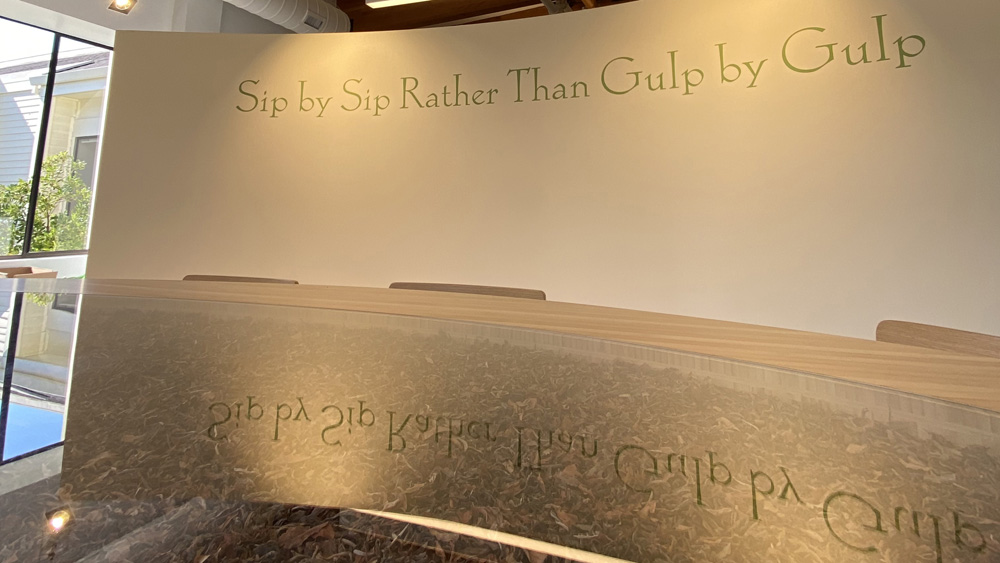
Classical Feng Shui is characterized by repeatable patterns and considers time as well as space, she adds. The animals in Chinese astrology come into play, and as time shifts and different animals become more dominant, the energy changes. As a result, making annual updates to a space’s Feng Shui is important. “It’s not a magic bullet. You don’t just do it and forget it. You have to take action,” she says, explaining that not everything fits into a fixed plan, and Feng Shui augments what a business has started.
Feng Shui began as a way to help imperial families to have power and prosper, she explains. It was also used in military operations and by the affluent, but was forbidden for everyone else. “In China, up until the ’60s, if you were caught using Feng Shui it was punishable by death. That’s how powerful it is.” Increasing wealth and ultimate power was the primary goal. Today this can be looked at as a competitive edge, attracting better clients, and more wealth.
During these pandemic times, Zemansky feels that space is more important than ever. With much of the global workforce working remotely, tapping into the empowering methodology of Feng Shui can help people set up their space for the new norm to be more productive, focused and successful. “It’s like gravity—you don’t need to believe it for it to work. The energy of Feng Shui is there to help. Why not use it!”
World view
Helping others is one of The Republic of Tea’s enduring values, and its philanthropic endeavors are based on the Chinese philosophy Tashun, a belief that when people care about each other, the result is harmony and well-being for the whole.
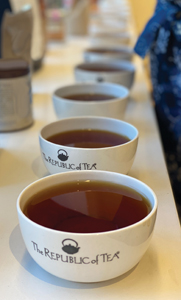 The company sources its teas and herbs from more than 50 different countries, including Sri Lanka, where it launched a program to teach the women in tea gardens about nutrition, financial literacy and hygiene. The goal was to reach 8,000 women, and 27,000 have participated. “They’ve learned how to create their own kitchen gardens and grow their own foods,” says Richens Tucker. In fact, they produced such an abundance of produce that they were able to create community kitchens, sell food and establish an independent revenue stream, she adds. It was especially helpful this spring, when people were quarantined and food supplies were limited. The company also supports Homeward Bound of Marin and is a partner with Whole Food’s Whole Planet Foundation, funding $25,000 in microloans each year. “It’s dynamic to see how a little bit can make such a big difference,” observes Richens Tucker. “It’s a way to have small businesses thrive and raises people out of poverty.”
The company sources its teas and herbs from more than 50 different countries, including Sri Lanka, where it launched a program to teach the women in tea gardens about nutrition, financial literacy and hygiene. The goal was to reach 8,000 women, and 27,000 have participated. “They’ve learned how to create their own kitchen gardens and grow their own foods,” says Richens Tucker. In fact, they produced such an abundance of produce that they were able to create community kitchens, sell food and establish an independent revenue stream, she adds. It was especially helpful this spring, when people were quarantined and food supplies were limited. The company also supports Homeward Bound of Marin and is a partner with Whole Food’s Whole Planet Foundation, funding $25,000 in microloans each year. “It’s dynamic to see how a little bit can make such a big difference,” observes Richens Tucker. “It’s a way to have small businesses thrive and raises people out of poverty.”
Zemansky is of the same mind—when people feel good, the feeling spreads. “When you Feng Shui a space, you’re doing it to make it feel better for everyone,” she says. Such is the strength of the flow of Feng Shui. It’s a gentle yet powerful force for business success that creates a special kind of ambiance that increases creativity and productivity. At its best, it also inspires people to reach out and change lives, making the world better for others, too.


